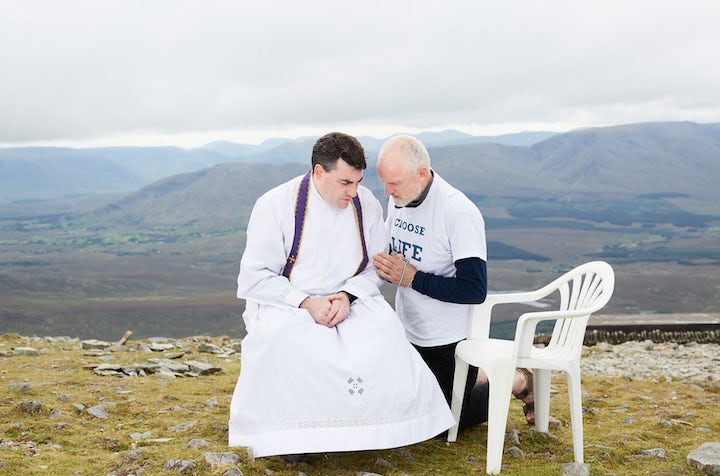In a photo essay on the Irish abortion referendum in London’s The Guardian newspaper, one picture (see below) depicted a man kneeling next to a seated priest, who was wearing an alb and a purple stole, on the summit of the mountain Croagh Patrick. The caption read, “An anti-abortion campaigner recites the Eucharist with a priest.” The picture and caption made the rounds on Catholic social media, which mocked (sometimes gently, sometimes not at all gently) the erroneous description of what was very clearly a celebration of the Sacrament of Penance.
As many Catholics and not a few non-Catholics are aware, the Eucharist is not something one recites like a prayer or an oath. It is a sacrament, and the proper verb attaching to sacraments usually is “celebrate.” There is, to be clear, an archaic but correct form, “reading Holy Mass.” But that is not the sacrament taking place in the picture.
Still, while many took the opportunity to tease a photo editor who very likely is not Catholic for a lack of familiarity with Catholic terminology, it reminded me of a much deeper and more disconcerting problem: the fact that so many Catholics also lack an understanding of that terminology.
In a large archdiocese where I formerly worked, surveys showed that the greatest gap in knowledge for children going through parish religious education was in Catholic vocabulary. Too many of our children – and also their parents one suspects – do not know the words that express our faith and, consequently, their ability to know and live the faith is deeply hindered.
I’ve experienced this first-hand in my work in parish religious education. It’s not uncommon for me to get questions like, “What’s a monsignor?” or “I was in a church and saw a little umbrella and a bell, what were they?” (The umbrellino and tinntinnabulum are signs that the church has been designated a basilica.) These questions are not entirely surprising since people rarely encounter such things. But I received a shock the first several times I taught classes on the Eucharist.
I was prepared for the fact that most people might not have the background in Aristotelian metaphysics to explain what “transubstantiation” meant. So I came ready to explain it. But I have found that not only are people unfamiliar with the meaning of the word, they’re unfamiliar with the word itself. They haven’t heard it. We’re reaching the point where people aren’t just losing the meaning of Catholic words; they’re losing the words themselves.
This may well be due to the pendulum swings in catechetical approaches over the last several decades. People of my grandparents’ vintage were raised on Baltimore Catechism-style texts, with lists and answers to memorize, which gave them basic definitions of the key terms of the faith.

Some believe that this approach produced a shallow faith, allegedly never developing beyond the answers in the little blue booklet they received as a child. So, the following generations were given a more experiential catechesis, emphasizing an emotional connection to the love of the God who had made them. Rather than memorized definitions, these children left religious education with nothing more than popsicle-stick depictions of the Last Supper.
What is the result of these varied approaches? People of the older generation still attend Mass and, by and large, believe the teachings of the Church, and lament that their children neither go to Mass nor really know the faith that they reject. Something has been lost. Something went awry.
Now, of course, these are generalizations: there are many people of the Baltimore Catechism generation who fell away from the faith, just as there are plenty in the succeeding cohort who are active in their faith. But basically, the patterns hold and are instructive. We need both an emotional connection and an intellectual substance in our faith. But the intellectual is a more fertile soil. In the scholastic phrasing, knowledge leads to love: one cannot love a God one does not know. One cannot love a faith one is not familiar with. Otherwise, just what is it that one loves?
Sometimes the more emotive approach attempted to substitute different words for the classic terms or to mark different points of emphasis. The Mass was described primarily as a family meal, not a sacrificial meal. Reconciliation was described as sharing rather than confession. These terms are hardly synonyms.
But even synonyms are not always synonymous, as J.R.R. Tolkien noted in one of his letters. Two words may have a common referent, as do argent and silver, but no one would use them in the same way or in the same context. I would never say that I drive an argent sedan or that the runner won an argent medal. Even the connotations of words matter in the theological context.
Lists and terms may be insufficient for passing on the faith, but they are necessary. Words convey concepts – lose the word, lose the idea. (It’s fashionable to quote Orwell’s 1984 these days in all sorts of contexts, but it’s relevant.) These words embody our faith.
Battles have been fought in theological schools and ecumenical councils over words. At the Council of Nicaea, there was only “one iota difference” between the Arian heresy (homoiousios= “of a similar substance”) and orthodoxy (homoousios= “of the same substance”), two very different ways of understanding Jesus’ relation to God the Father.
If we are concerned about passing on our faith to the young, we must worry ourselves over every iota, every jot and tittle. It can mean the difference between truth and error, between the faith enduring and disappearing.
*Image: “An anti-abortion campaigner recites the Eucharist with a priest.” Really Guardian?















